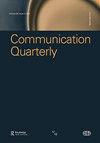Does outgroup media exposure reduce prejudice in real life? Testing mediated contact effects with media diets in South Africa
IF 1
Q2 COMMUNICATION
引用次数: 0
Abstract
ABSTRACT Mediated intergroup contact can reduce recipients’ prejudice. However, prior studies have mainly examined the effects of carefully selected stimuli, contents, and genres. We investigated whether outgroup exposure on the level of real-life, multi-channel media diets is associated with reduced prejudice. Prior scholarship offers contradictory expectations: We tested this with survey data from South Africa where the numeric group constellation and the media system should make blatant stereotyping in traditional media less likely. While social media interactions were associated with more positive attitudes, effects in traditional media varied across the type of medium and sample. This suggests that it will be difficult to associate a person’s general media usage with their prejudice. We discuss the challenges for future tests of the real-life potential of mediated intergroup contact. Altogether, our study dampens initial hopes and underlines the importance of targeted interventions and outstanding single contents.接触外群体媒体能减少现实生活中的偏见吗?在南非测试媒介饮食介导的接触效应
中介的群体间接触可以减少接受者的偏见。然而,先前的研究主要考察了精心选择的刺激、内容和类型的影响。我们调查了在现实生活中,多渠道媒体饮食水平上的外群体暴露是否与减少偏见有关。先前的学术研究提供了相互矛盾的期望:我们用来自南非的调查数据进行了测试,在南非,数字群体星座和媒体系统应该使传统媒体中明显的刻板印象不太可能发生。虽然社交媒体互动与更积极的态度有关,但传统媒体的影响因媒介类型和样本而异。这表明很难将一个人的一般媒体使用与他们的偏见联系起来。我们讨论了未来对现实生活中介导的群体间接触潜力测试的挑战。总之,我们的研究抑制了最初的希望,并强调了有针对性的干预和突出的单一内容的重要性。
本文章由计算机程序翻译,如有差异,请以英文原文为准。
求助全文
约1分钟内获得全文
求助全文

 求助内容:
求助内容: 应助结果提醒方式:
应助结果提醒方式:


